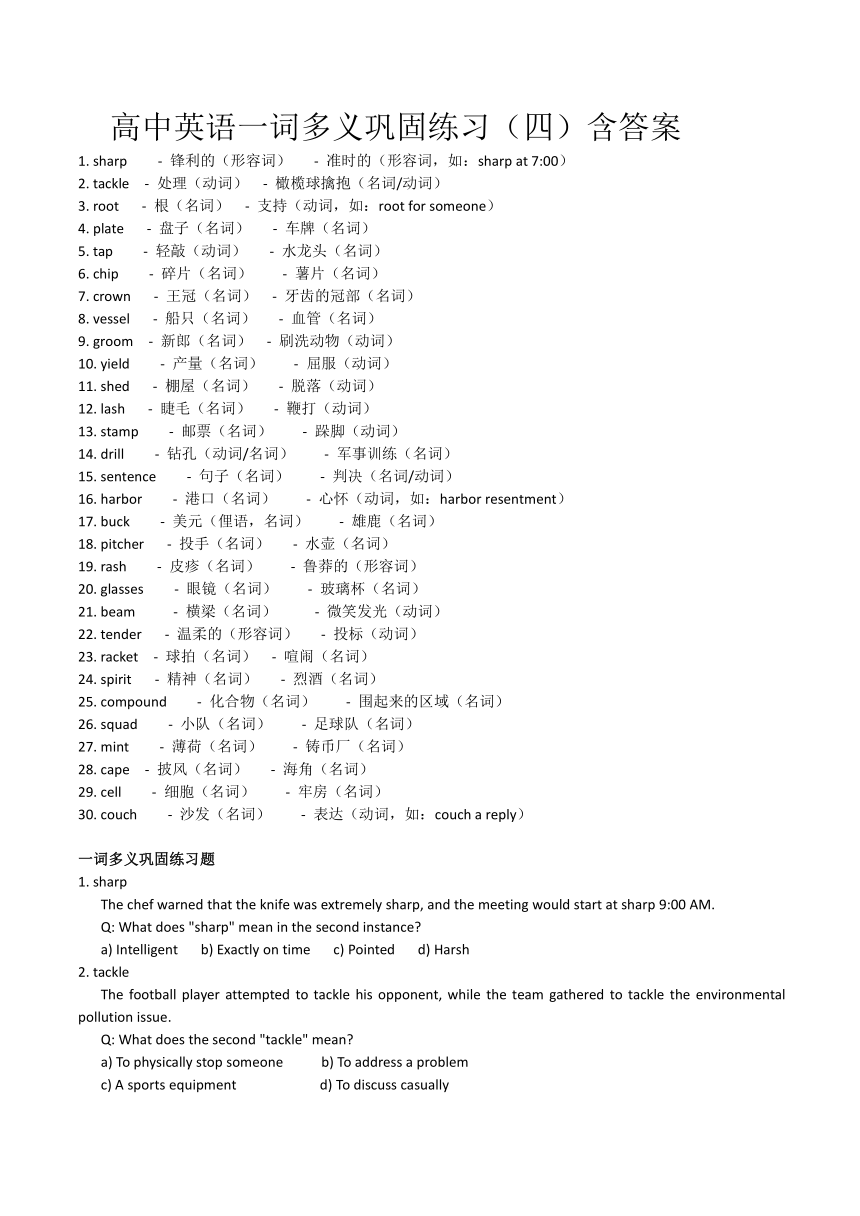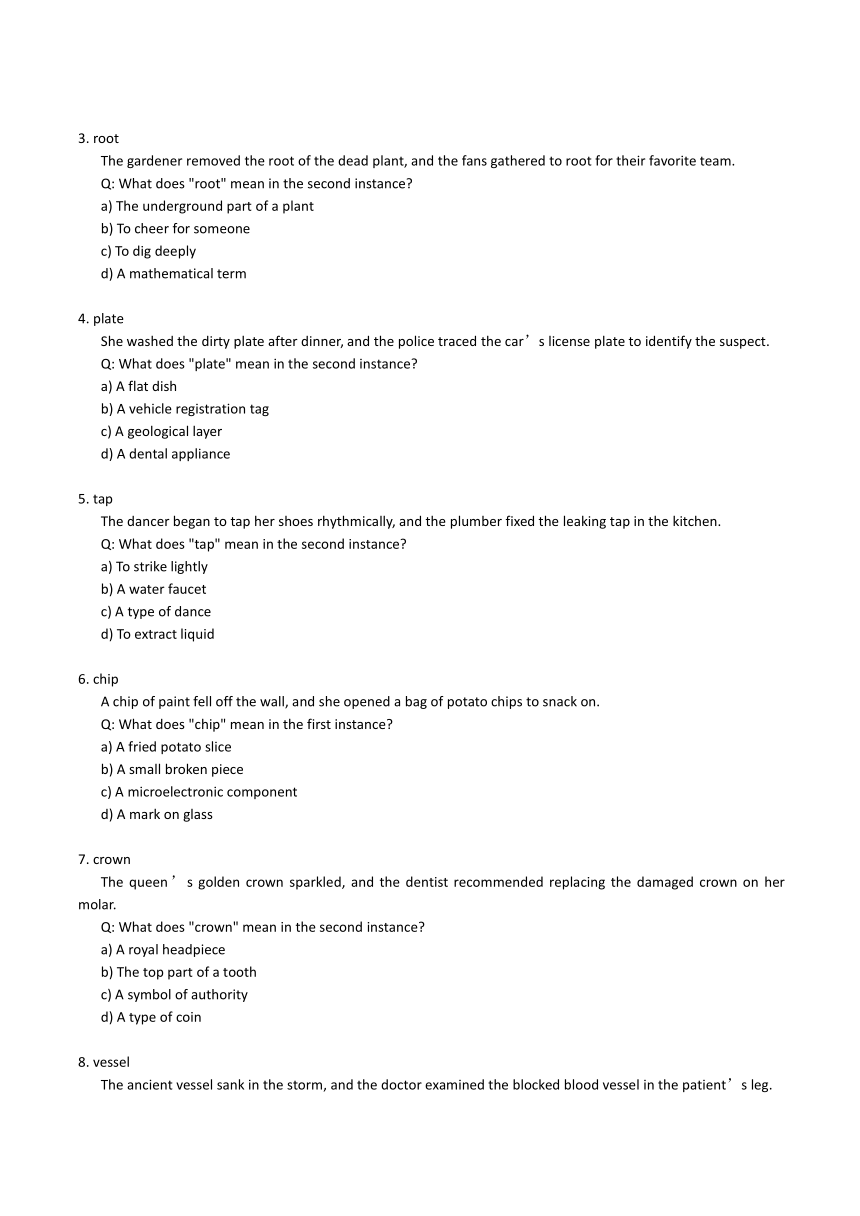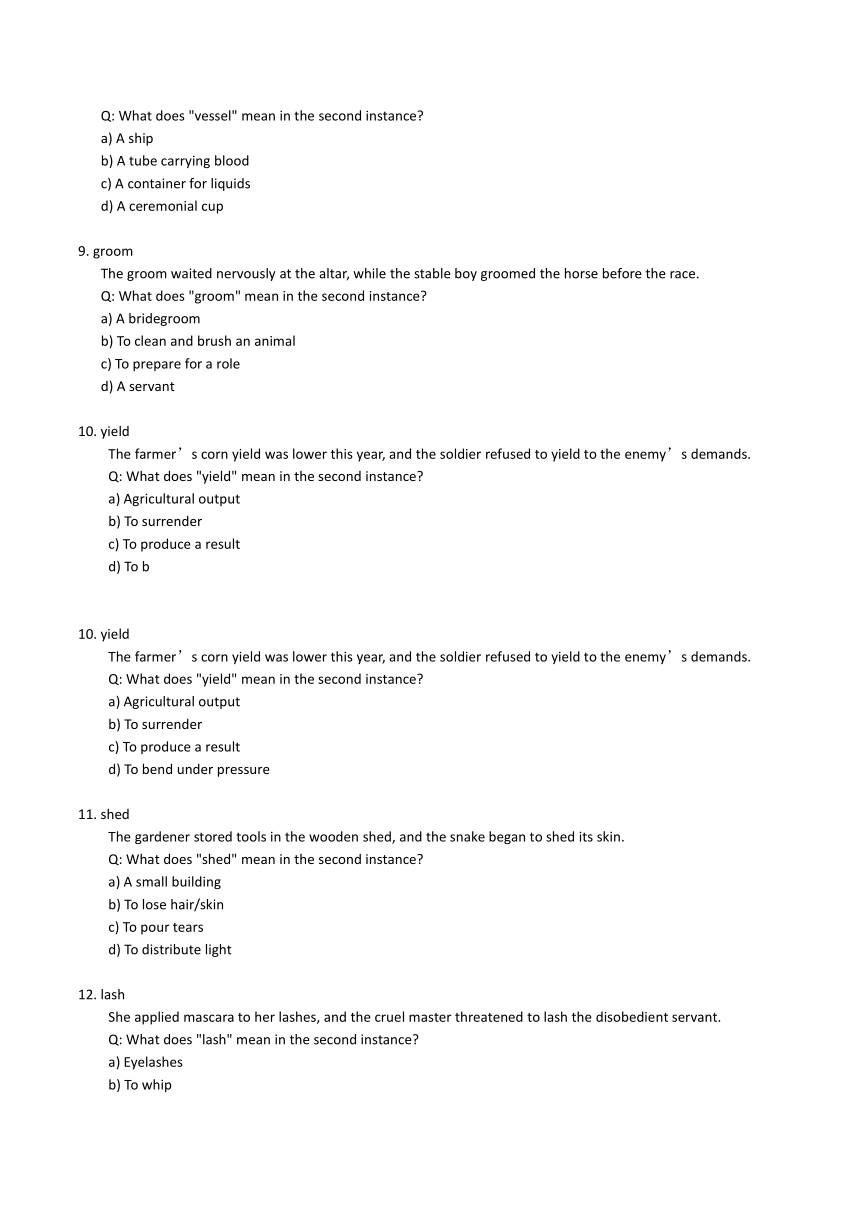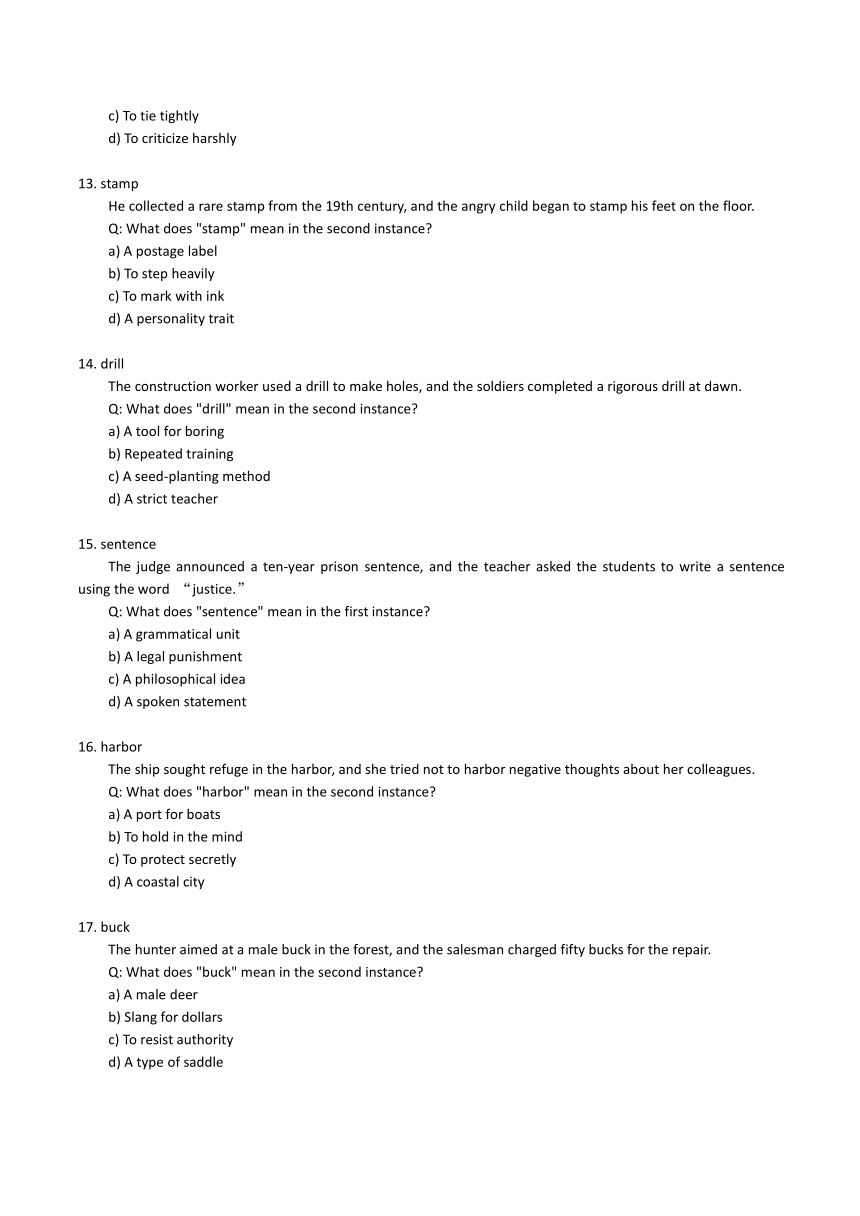高中英语一词多义巩固练习四(含答案)-2025届高三英语二轮复习
文档属性
| 名称 | 高中英语一词多义巩固练习四(含答案)-2025届高三英语二轮复习 |  | |
| 格式 | docx | ||
| 文件大小 | 22.8KB | ||
| 资源类型 | 教案 | ||
| 版本资源 | 人教版(2019) | ||
| 科目 | 英语 | ||
| 更新时间 | 2025-02-20 22:48:06 | ||
图片预览




文档简介
高中英语一词多义巩固练习(四)含答案
1. sharp - 锋利的(形容词) - 准时的(形容词,如:sharp at 7:00)
2. tackle - 处理(动词) - 橄榄球擒抱(名词/动词)
3. root - 根(名词) - 支持(动词,如:root for someone)
4. plate - 盘子(名词) - 车牌(名词)
5. tap - 轻敲(动词) - 水龙头(名词)
6. chip - 碎片(名词) - 薯片(名词)
7. crown - 王冠(名词) - 牙齿的冠部(名词)
8. vessel - 船只(名词) - 血管(名词)
9. groom - 新郎(名词) - 刷洗动物(动词)
10. yield - 产量(名词) - 屈服(动词)
11. shed - 棚屋(名词) - 脱落(动词)
12. lash - 睫毛(名词) - 鞭打(动词)
13. stamp - 邮票(名词) - 跺脚(动词)
14. drill - 钻孔(动词/名词) - 军事训练(名词)
15. sentence - 句子(名词) - 判决(名词/动词)
16. harbor - 港口(名词) - 心怀(动词,如:harbor resentment)
17. buck - 美元(俚语,名词) - 雄鹿(名词)
18. pitcher - 投手(名词) - 水壶(名词)
19. rash - 皮疹(名词) - 鲁莽的(形容词)
20. glasses - 眼镜(名词) - 玻璃杯(名词)
21. beam - 横梁(名词) - 微笑发光(动词)
22. tender - 温柔的(形容词) - 投标(动词)
23. racket - 球拍(名词) - 喧闹(名词)
24. spirit - 精神(名词) - 烈酒(名词)
pound - 化合物(名词) - 围起来的区域(名词)
26. squad - 小队(名词) - 足球队(名词)
27. mint - 薄荷(名词) - 铸币厂(名词)
28. cape - 披风(名词) - 海角(名词)
29. cell - 细胞(名词) - 牢房(名词)
30. couch - 沙发(名词) - 表达(动词,如:couch a reply)
一词多义巩固练习题
1. sharp
The chef warned that the knife was extremely sharp, and the meeting would start at sharp 9:00 AM.
Q: What does "sharp" mean in the second instance
a) Intelligent b) Exactly on time c) Pointed d) Harsh
2. tackle
The football player attempted to tackle his opponent, while the team gathered to tackle the environmental pollution issue.
Q: What does the second "tackle" mean
a) To physically stop someone b) To address a problem
c) A sports equipment d) To discuss casually
3. root
The gardener removed the root of the dead plant, and the fans gathered to root for their favorite team.
Q: What does "root" mean in the second instance
a) The underground part of a plant
b) To cheer for someone
c) To dig deeply
d) A mathematical term
4. plate
She washed the dirty plate after dinner, and the police traced the car’s license plate to identify the suspect.
Q: What does "plate" mean in the second instance
a) A flat dish
b) A vehicle registration tag
c) A geological layer
d) A dental appliance
5. tap
The dancer began to tap her shoes rhythmically, and the plumber fixed the leaking tap in the kitchen.
Q: What does "tap" mean in the second instance
a) To strike lightly
b) A water faucet
c) A type of dance
d) To extract liquid
6. chip
A chip of paint fell off the wall, and she opened a bag of potato chips to snack on.
Q: What does "chip" mean in the first instance
a) A fried potato slice
b) A small broken piece
c) A microelectronic component
d) A mark on glass
7. crown
The queen’s golden crown sparkled, and the dentist recommended replacing the damaged crown on her molar.
Q: What does "crown" mean in the second instance
a) A royal headpiece
b) The top part of a tooth
c) A symbol of authority
d) A type of coin
8. vessel
The ancient vessel sank in the storm, and the doctor examined the blocked blood vessel in the patient’s leg.
Q: What does "vessel" mean in the second instance
a) A ship
b) A tube carrying blood
c) A container for liquids
d) A ceremonial cup
9. groom
The groom waited nervously at the altar, while the stable boy groomed the horse before the race.
Q: What does "groom" mean in the second instance
a) A bridegroom
b) To clean and brush an animal
c) To prepare for a role
d) A servant
10. yield
The farmer’s corn yield was lower this year, and the soldier refused to yield to the enemy’s demands.
Q: What does "yield" mean in the second instance
a) Agricultural output
b) To surrender
c) To produce a result
d) To b
10. yield
The farmer’s corn yield was lower this year, and the soldier refused to yield to the enemy’s demands.
Q: What does "yield" mean in the second instance
a) Agricultural output
b) To surrender
c) To produce a result
d) To bend under pressure
11. shed
The gardener stored tools in the wooden shed, and the snake began to shed its skin.
Q: What does "shed" mean in the second instance
a) A small building
b) To lose hair/skin
c) To pour tears
d) To distribute light
12. lash
She applied mascara to her lashes, and the cruel master threatened to lash the disobedient servant.
Q: What does "lash" mean in the second instance
a) Eyelashes
b) To whip
c) To tie tightly
d) To criticize harshly
13. stamp
He collected a rare stamp from the 19th century, and the angry child began to stamp his feet on the floor.
Q: What does "stamp" mean in the second instance
a) A postage label
b) To step heavily
c) To mark with ink
d) A personality trait
14. drill
The construction worker used a drill to make holes, and the soldiers completed a rigorous drill at dawn.
Q: What does "drill" mean in the second instance
a) A tool for boring
b) Repeated training
c) A seed-planting method
d) A strict teacher
15. sentence
The judge announced a ten-year prison sentence, and the teacher asked the students to write a sentence using the word “justice.”
Q: What does "sentence" mean in the first instance
a) A grammatical unit
b) A legal punishment
c) A philosophical idea
d) A spoken statement
16. harbor
The ship sought refuge in the harbor, and she tried not to harbor negative thoughts about her colleagues.
Q: What does "harbor" mean in the second instance
a) A port for boats
b) To hold in the mind
c) To protect secretly
d) A coastal city
17. buck
The hunter aimed at a male buck in the forest, and the salesman charged fifty bucks for the repair.
Q: What does "buck" mean in the second instance
a) A male deer
b) Slang for dollars
c) To resist authority
d) A type of saddle
18. pitcher
The baseball pitcher threw a curveball, and the waiter brought a pitcher of lemonade to the table.
Q: What does "pitcher" mean in the second instance
a) A player who throws the ball
b) A large jug
c) A plant container
d) A type of strategy
19. rash
The child developed a red rash after touching poison ivy, and his rash decision to quit the job surprised everyone.
Q: What does "rash" mean in the second instance
a) A skin condition
b) Reckless
c) A sudden event
d) To act hastily
20. glasses
He cleaned his glasses to read the menu, and the bartender filled two glasses with sparkling water.
Q: What does "glasses" mean in the first instance
a) Drinking containers
b) Spectacles
c) Magnifying lenses
d) Laboratory equipment
21. beam
The wooden beam supported the roof, and her face began to beam with pride when she received the award.
Q: What does "beam" mean in the second instance
a) A structural element
b) To smile radiantly
c) To transmit signals
d) A ray of light
22. tender
The mother’s tender touch comforted the baby, and the company submitted a tender for the construction project.
Q: What does "tender" mean in the second instance
a) Gentle and caring
b) A formal bid
c) Soft food
d) To offer money
23. racket
The tennis player replaced her broken racket, and the neighbors complained about the loud racket from the party.
Q: What does "racket" mean in the second instance
a) A sports tool
b) Noisy disturbance
c) A fraudulent scheme
d) A type of dance
24. spirit
The team showed great spirit during the match, and the bartender mixed a cocktail with strong spirit.
Q: What does "spirit" mean in the second instance
a) Enthusiasm
b) Alcoholic liquid
c) A ghost
d) Moral character
pound
The chemist analyzed the chemical compound, and the embassy was located inside a secure compound.
Q: What does "compound" mean in the second instance
a) A substance
b) A fenced area
c) To increase
d) A grammatical term
26. squad
The police squad arrived at the crime scene, and the soccer squad trained intensively for the finals.
Q: What does "squad" mean in the second instance
a) A military unit
b) A sports team
c) A group of friends
d) A tactical plan
27. mint
She planted mint in her herb garden, and the ancient coin was stamped with the mark of a royal mint.
Q: What does "mint" mean in the second instance
a) A fragrant herb
b) A place producing coins
c) Perfect condition
d) A type of candy
28. cape
The superhero wore a flowing red cape, and the sailors navigated around the rocky cape to avoid storms.
Q: What does "cape" mean in the second instance
a) A cloak
b) A coastal landform
c) A type of fruit
d) A military rank
29. cell
The biologist studied the structure of a cell, and the prisoner spent ten years in a solitary cell.
Q: What does "cell" mean in the second instance
a) A biological unit
b) A prison room
c) A small group
d) A mobile phone
30. couch
They bought a leather couch for the living room, and the diplomat carefully couched his criticism in polite terms.
Q: What does "couch" mean in the second instance
a) A sofa
b) To phrase indirectly
c) To lie down
d) To conceal
答案
1. b) 2. b) 3. b) 4. b) 5. b) 6. b) 7. b) 8. b) 9. b) 10. b)
11. b) 12. b) 13. b) 14. b) 15. b) 16. b) 17. b) 18. b) 19. b) 20. b)
21. b) 22. b) 23. b) 24. b) 25. b) 26. b) 27. b) 28. b) 29. b) 30. b)
1. sharp - 锋利的(形容词) - 准时的(形容词,如:sharp at 7:00)
2. tackle - 处理(动词) - 橄榄球擒抱(名词/动词)
3. root - 根(名词) - 支持(动词,如:root for someone)
4. plate - 盘子(名词) - 车牌(名词)
5. tap - 轻敲(动词) - 水龙头(名词)
6. chip - 碎片(名词) - 薯片(名词)
7. crown - 王冠(名词) - 牙齿的冠部(名词)
8. vessel - 船只(名词) - 血管(名词)
9. groom - 新郎(名词) - 刷洗动物(动词)
10. yield - 产量(名词) - 屈服(动词)
11. shed - 棚屋(名词) - 脱落(动词)
12. lash - 睫毛(名词) - 鞭打(动词)
13. stamp - 邮票(名词) - 跺脚(动词)
14. drill - 钻孔(动词/名词) - 军事训练(名词)
15. sentence - 句子(名词) - 判决(名词/动词)
16. harbor - 港口(名词) - 心怀(动词,如:harbor resentment)
17. buck - 美元(俚语,名词) - 雄鹿(名词)
18. pitcher - 投手(名词) - 水壶(名词)
19. rash - 皮疹(名词) - 鲁莽的(形容词)
20. glasses - 眼镜(名词) - 玻璃杯(名词)
21. beam - 横梁(名词) - 微笑发光(动词)
22. tender - 温柔的(形容词) - 投标(动词)
23. racket - 球拍(名词) - 喧闹(名词)
24. spirit - 精神(名词) - 烈酒(名词)
pound - 化合物(名词) - 围起来的区域(名词)
26. squad - 小队(名词) - 足球队(名词)
27. mint - 薄荷(名词) - 铸币厂(名词)
28. cape - 披风(名词) - 海角(名词)
29. cell - 细胞(名词) - 牢房(名词)
30. couch - 沙发(名词) - 表达(动词,如:couch a reply)
一词多义巩固练习题
1. sharp
The chef warned that the knife was extremely sharp, and the meeting would start at sharp 9:00 AM.
Q: What does "sharp" mean in the second instance
a) Intelligent b) Exactly on time c) Pointed d) Harsh
2. tackle
The football player attempted to tackle his opponent, while the team gathered to tackle the environmental pollution issue.
Q: What does the second "tackle" mean
a) To physically stop someone b) To address a problem
c) A sports equipment d) To discuss casually
3. root
The gardener removed the root of the dead plant, and the fans gathered to root for their favorite team.
Q: What does "root" mean in the second instance
a) The underground part of a plant
b) To cheer for someone
c) To dig deeply
d) A mathematical term
4. plate
She washed the dirty plate after dinner, and the police traced the car’s license plate to identify the suspect.
Q: What does "plate" mean in the second instance
a) A flat dish
b) A vehicle registration tag
c) A geological layer
d) A dental appliance
5. tap
The dancer began to tap her shoes rhythmically, and the plumber fixed the leaking tap in the kitchen.
Q: What does "tap" mean in the second instance
a) To strike lightly
b) A water faucet
c) A type of dance
d) To extract liquid
6. chip
A chip of paint fell off the wall, and she opened a bag of potato chips to snack on.
Q: What does "chip" mean in the first instance
a) A fried potato slice
b) A small broken piece
c) A microelectronic component
d) A mark on glass
7. crown
The queen’s golden crown sparkled, and the dentist recommended replacing the damaged crown on her molar.
Q: What does "crown" mean in the second instance
a) A royal headpiece
b) The top part of a tooth
c) A symbol of authority
d) A type of coin
8. vessel
The ancient vessel sank in the storm, and the doctor examined the blocked blood vessel in the patient’s leg.
Q: What does "vessel" mean in the second instance
a) A ship
b) A tube carrying blood
c) A container for liquids
d) A ceremonial cup
9. groom
The groom waited nervously at the altar, while the stable boy groomed the horse before the race.
Q: What does "groom" mean in the second instance
a) A bridegroom
b) To clean and brush an animal
c) To prepare for a role
d) A servant
10. yield
The farmer’s corn yield was lower this year, and the soldier refused to yield to the enemy’s demands.
Q: What does "yield" mean in the second instance
a) Agricultural output
b) To surrender
c) To produce a result
d) To b
10. yield
The farmer’s corn yield was lower this year, and the soldier refused to yield to the enemy’s demands.
Q: What does "yield" mean in the second instance
a) Agricultural output
b) To surrender
c) To produce a result
d) To bend under pressure
11. shed
The gardener stored tools in the wooden shed, and the snake began to shed its skin.
Q: What does "shed" mean in the second instance
a) A small building
b) To lose hair/skin
c) To pour tears
d) To distribute light
12. lash
She applied mascara to her lashes, and the cruel master threatened to lash the disobedient servant.
Q: What does "lash" mean in the second instance
a) Eyelashes
b) To whip
c) To tie tightly
d) To criticize harshly
13. stamp
He collected a rare stamp from the 19th century, and the angry child began to stamp his feet on the floor.
Q: What does "stamp" mean in the second instance
a) A postage label
b) To step heavily
c) To mark with ink
d) A personality trait
14. drill
The construction worker used a drill to make holes, and the soldiers completed a rigorous drill at dawn.
Q: What does "drill" mean in the second instance
a) A tool for boring
b) Repeated training
c) A seed-planting method
d) A strict teacher
15. sentence
The judge announced a ten-year prison sentence, and the teacher asked the students to write a sentence using the word “justice.”
Q: What does "sentence" mean in the first instance
a) A grammatical unit
b) A legal punishment
c) A philosophical idea
d) A spoken statement
16. harbor
The ship sought refuge in the harbor, and she tried not to harbor negative thoughts about her colleagues.
Q: What does "harbor" mean in the second instance
a) A port for boats
b) To hold in the mind
c) To protect secretly
d) A coastal city
17. buck
The hunter aimed at a male buck in the forest, and the salesman charged fifty bucks for the repair.
Q: What does "buck" mean in the second instance
a) A male deer
b) Slang for dollars
c) To resist authority
d) A type of saddle
18. pitcher
The baseball pitcher threw a curveball, and the waiter brought a pitcher of lemonade to the table.
Q: What does "pitcher" mean in the second instance
a) A player who throws the ball
b) A large jug
c) A plant container
d) A type of strategy
19. rash
The child developed a red rash after touching poison ivy, and his rash decision to quit the job surprised everyone.
Q: What does "rash" mean in the second instance
a) A skin condition
b) Reckless
c) A sudden event
d) To act hastily
20. glasses
He cleaned his glasses to read the menu, and the bartender filled two glasses with sparkling water.
Q: What does "glasses" mean in the first instance
a) Drinking containers
b) Spectacles
c) Magnifying lenses
d) Laboratory equipment
21. beam
The wooden beam supported the roof, and her face began to beam with pride when she received the award.
Q: What does "beam" mean in the second instance
a) A structural element
b) To smile radiantly
c) To transmit signals
d) A ray of light
22. tender
The mother’s tender touch comforted the baby, and the company submitted a tender for the construction project.
Q: What does "tender" mean in the second instance
a) Gentle and caring
b) A formal bid
c) Soft food
d) To offer money
23. racket
The tennis player replaced her broken racket, and the neighbors complained about the loud racket from the party.
Q: What does "racket" mean in the second instance
a) A sports tool
b) Noisy disturbance
c) A fraudulent scheme
d) A type of dance
24. spirit
The team showed great spirit during the match, and the bartender mixed a cocktail with strong spirit.
Q: What does "spirit" mean in the second instance
a) Enthusiasm
b) Alcoholic liquid
c) A ghost
d) Moral character
pound
The chemist analyzed the chemical compound, and the embassy was located inside a secure compound.
Q: What does "compound" mean in the second instance
a) A substance
b) A fenced area
c) To increase
d) A grammatical term
26. squad
The police squad arrived at the crime scene, and the soccer squad trained intensively for the finals.
Q: What does "squad" mean in the second instance
a) A military unit
b) A sports team
c) A group of friends
d) A tactical plan
27. mint
She planted mint in her herb garden, and the ancient coin was stamped with the mark of a royal mint.
Q: What does "mint" mean in the second instance
a) A fragrant herb
b) A place producing coins
c) Perfect condition
d) A type of candy
28. cape
The superhero wore a flowing red cape, and the sailors navigated around the rocky cape to avoid storms.
Q: What does "cape" mean in the second instance
a) A cloak
b) A coastal landform
c) A type of fruit
d) A military rank
29. cell
The biologist studied the structure of a cell, and the prisoner spent ten years in a solitary cell.
Q: What does "cell" mean in the second instance
a) A biological unit
b) A prison room
c) A small group
d) A mobile phone
30. couch
They bought a leather couch for the living room, and the diplomat carefully couched his criticism in polite terms.
Q: What does "couch" mean in the second instance
a) A sofa
b) To phrase indirectly
c) To lie down
d) To conceal
答案
1. b) 2. b) 3. b) 4. b) 5. b) 6. b) 7. b) 8. b) 9. b) 10. b)
11. b) 12. b) 13. b) 14. b) 15. b) 16. b) 17. b) 18. b) 19. b) 20. b)
21. b) 22. b) 23. b) 24. b) 25. b) 26. b) 27. b) 28. b) 29. b) 30. b)
